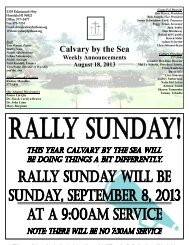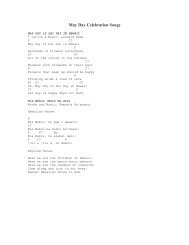Maria Montessori and the Sensitive Periods for Music Education
Maria Montessori and the Sensitive Periods for Music Education
Maria Montessori and the Sensitive Periods for Music Education
You also want an ePaper? Increase the reach of your titles
YUMPU automatically turns print PDFs into web optimized ePapers that Google loves.
<strong>Maria</strong> <strong>Montessori</strong> <strong>and</strong> <strong>the</strong> <strong>Sensitive</strong> <strong>Periods</strong> <strong>for</strong> <strong>Music</strong> <strong>Education</strong><br />
From <strong>Music</strong> <strong>and</strong> A Child’s Total Development in Early Childhood<br />
Master’s Thesis by Amie Lawyer<br />
Chaminade University of Honolulu December 2004<br />
According to <strong>Maria</strong> <strong>Montessori</strong> M.D., it is very important <strong>for</strong> children to receive<br />
exposure <strong>and</strong> experience with music between <strong>the</strong> ages of two <strong>and</strong> a half to six. Dr.<br />
<strong>Montessori</strong> called this period <strong>the</strong> sensitive period <strong>for</strong> learning. During this sensitive<br />
period, children are sensitive to learning <strong>and</strong> absorbing music. The sensitive periods are<br />
blocks or stages of time that a child is particularly sensitive to or attuned to <strong>the</strong><br />
acquisition of some particular knowledge or skill (<strong>Montessori</strong>, 1966). Don Campbell also<br />
defines sensitive periods or critical windows as periods where development takes place at<br />
a more rapid <strong>and</strong> ef<strong>for</strong>tless pace, <strong>and</strong> are periods of development where <strong>the</strong> in<strong>for</strong>mation<br />
that is learned is less likely to be <strong>for</strong>gotten (Campbell, 2000).<br />
Children should receive music instruction during <strong>the</strong>ir sensitive period, ages two<br />
through six. A problem occurs when children do not receive music instruction during<br />
<strong>the</strong>se sensitive periods because <strong>the</strong>y lose out on valuable brain growth <strong>and</strong> development.<br />
According to <strong>Montessori</strong>, if children have not been able to learn a skill during his or her<br />
sensitive period <strong>the</strong> opportunity to learn it is lost (<strong>Montessori</strong>, 1966). In addition, <strong>Maria</strong><br />
<strong>Montessori</strong> M.D. stressed <strong>the</strong> importance <strong>for</strong> children to receive exposure <strong>and</strong> experience<br />
with music <strong>and</strong> language-rich experience between <strong>the</strong> ages of two <strong>and</strong> a half to six.<br />
Dr. <strong>Maria</strong> <strong>Montessori</strong> also believed in assisting <strong>the</strong> natural development of <strong>the</strong><br />
child by educating children through hearing <strong>and</strong> <strong>the</strong> o<strong>the</strong>r senses during what she called a<br />
child’s sensitive period <strong>for</strong> development (<strong>Montessori</strong>, 1966). The <strong>Montessori</strong> materials<br />
gradiate <strong>and</strong> adapt <strong>the</strong> stimuli that a child receives to support all areas of future
development such as helping a child to develop listening <strong>and</strong> language skills (<strong>Montessori</strong>,<br />
1967).<br />
Dr. <strong>Montessori</strong> believed that creative work lifts man up from <strong>the</strong> earth <strong>and</strong><br />
transports him into a higher world, which every soul may attain within its individual<br />
limits (<strong>Montessori</strong>, 1967).<br />
<strong>Music</strong> in early childhood is a critical aspect of a child’s development. The two<br />
<strong>and</strong> a half to six year old child is in <strong>the</strong> sensitive period of development <strong>and</strong> <strong>the</strong>re<strong>for</strong>e is<br />
especially sensitive to sensory-motor activities. Providing age-appropriate activities<br />
within <strong>the</strong> musical environment will allow children to develop <strong>the</strong>ir skills <strong>and</strong> reach <strong>the</strong>ir<br />
inherent musical potential. In <strong>the</strong> <strong>Montessori</strong> three to six classroom, singing <strong>and</strong> singing<br />
games are a very important part of <strong>the</strong> music curriculum because <strong>the</strong>y allow children to<br />
develop <strong>the</strong>ir inner musical ear. The voice is a child’s natural instrument <strong>and</strong> it is an<br />
instrument that every person possesses. As children participate in singing games <strong>the</strong>y are<br />
allowed to experience <strong>and</strong> absorb simple melodies through movement. These singing<br />
games can really help shy children to participate <strong>and</strong> sing along when <strong>the</strong> emphasis is on<br />
movement instead of just singing in a large group. Singing in <strong>the</strong> three to six <strong>Montessori</strong><br />
classrooms helps children develop <strong>the</strong>ir abilities to feel steady beat, chant rhymes, <strong>and</strong> to<br />
differentiate between musical comparatives such as loud to soft, fast to slow, <strong>and</strong> high to<br />
low (Getz, 2002).<br />
Dr. <strong>Maria</strong> <strong>Montessori</strong>, who greatly respected <strong>the</strong> muscular-sensorial approach,<br />
designed a set of materials <strong>and</strong> instruments that allow children to self-educate <strong>the</strong>mselves<br />
on an aural basis <strong>for</strong> most elements of music. The <strong>Montessori</strong> bells are an example of an<br />
instrument that is used in <strong>the</strong> <strong>Montessori</strong> three-six classroom. The bells were designed to
specifically train <strong>the</strong> ear to perceive differences among musical sounds. The <strong>Montessori</strong><br />
bells consist of a series of bells that represent <strong>the</strong> whole tones <strong>and</strong> semi-tones of one<br />
octave. To work with <strong>the</strong> bells, <strong>the</strong> child is required to pair off <strong>the</strong> bells that produce <strong>the</strong><br />
same sound. This enables <strong>the</strong> child to learn how to discriminate, eventually learn how to<br />
arrange <strong>the</strong> bells in gradation, <strong>and</strong> to play <strong>the</strong> musical scale (Getz, 2002).<br />
According to Frank Leto, professional musician, <strong>Montessori</strong> three to six teacher,<br />
songwriter, <strong>and</strong> an Early Childhood <strong>and</strong> Elementary school music educator, music is a<br />
language. Children learn to speak <strong>the</strong>ir native language instinctively. As children have<br />
daily contact <strong>and</strong> interaction with <strong>the</strong>ir parents, family <strong>and</strong> friends, <strong>the</strong>y learn how to<br />
speak <strong>the</strong>ir language as a way of life. The language of music can be passed on to<br />
children in <strong>the</strong> same manner as <strong>the</strong>ir native language. When music is brought into a<br />
child’s environment <strong>the</strong>y are encouraged to participate in musical activities. Bringing<br />
music into a child’s environment gives him or her <strong>the</strong> opportunity to acquire a musical<br />
vocabulary of rhythms, melodies <strong>and</strong> songs (Leto, 1988).<br />
Works Cited<br />
Campbell, Don (2000). The Mozart Effect <strong>for</strong> Children, Awakening Your Child’s Mind,<br />
Health, <strong>and</strong> Creativity with <strong>Music</strong>. New York, NY: Harper Collins Inc.<br />
Getz, Pat (2002). “<strong>Montessori</strong>-Inspired <strong>Music</strong> <strong>Education</strong>: A Look at <strong>the</strong> <strong>Montessori</strong><br />
Learning Center’s <strong>Music</strong> Curriculum” Retrieved June 29, 2002 from<br />
http://www.rway.com/commserv/mlc/articles/music.htm<br />
Leto Frank (1988). Frank Leto’s Time For <strong>Music</strong> Songbook: Kid’s <strong>Music</strong> Ventures.<br />
www.frankleto.com<br />
<strong>Montessori</strong>, <strong>Maria</strong> (1966). The Secret of Childhood. New York, NY: Ballantine Books.
<strong>Montessori</strong>, <strong>Maria</strong> (1967). The Discovery of <strong>the</strong> child. New York, NY: Ballantine Books.












